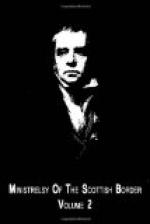[Footnote B: Colonel Hurry, with a party of horse, surprised the town, while Montrose’s Highlanders and cavaliers were “dispersed through the town, drinking carelessly in their lodgings; and, hearing the horse’s feet, and great noise, were astonished, never dreaming of their enemy. However, Donald Farquharson happened to come to the causey, where he was cruelly slain, anent the Court de Guard; a brave gentleman, and one of the noblest captains amongst all the Highlanders of Scotland. Two or three others were killed, and some (taken prisoners) had to Edinburgh, and cast into irons in the tolbooth. Great lamentation was made for this gallant, being still the king’s man for life and death.”—SPALDING Vol. II. p. 281. The journalist, to whom all matters were of equal importance, proceeds to inform us, that Hurry took the marquis of Huntly’s best horse, and, in his retreat through Montrose seized upon the marquis’s second son. He also expresses his regret, that “the said Donald Farquharson’s body was found in the street, stripped naked: for they tirr’d from off his body a rich stand of apparel, but put on the same day.”—Ibid.]
The following ballad, which is preserved by tradition in Selkirkshire, coincides accurately with historical fact. This, indeed, constitutes its sole merit. The Covenanters were not, I dare say, addicted, more than their successors “to the profane and unprofitable art of poem-making."[A] Still, however, they could not refrain from some strains of exultation, over the defeat of the truculent tyrant, James Grahame. For, gentle reader, Montrose, who, with resources which seemed as none, gained six victories, and reconquered a kingdom; who, a poet, a scholar, a cavalier, and a general, could have graced alike a court, and governed a camp; this Montrose was numbered, by his covenanted countrymen, among “the troublers of Israel, the fire-brands of hell, the Corahs, the Balaams, the Doegs, the Rabshakahs, the Hamans, the Tobiahs, and Sanballats of the time.”
[Footnote A: So little was the spirit of illiberal fanaticism decayed in some parts of Scotland, that only thirty years ago, when Wilson, the ingenious author of a poem, called “Clyde,” now republished, was inducted into the office of schoolmaster at Greenock, he was obliged formally, and in writing, to abjure "the profane and unprofitable art of poem-making." It is proper to add, that such an incident is now as unlikely to happen in Greenock as in London.]
THE BATTLE OF PHILIPHAUGH.
On Philiphaugh a fray began,
At Hairhead wood it ended;
The Scots out o’er the Graemes they
ran,
Sae merrily they bended.
Sir David frae the border came,
Wi’ heart an’
hand came he;
Wi’ him three thousand bonny Scotts,
To bear him company.
Wi’ him three thousand valiant men,
A noble sight to see!
A cloud o’ mist them weel concealed,
As close as e’er might
be.




